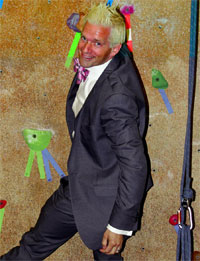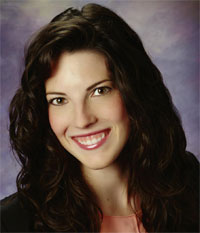Rock On
Lucas Kovalcik ’98

When Lucas Kovalcik tried rock climbing a few years after college, he was immediately hooked. “I just fell in love with the sport,” he says. “It’s one of those healthy addictions.” A few years later, the Hotel school grad turned his passion into a business by co-founding a pair of indoor climbing gyms. “It’s an exciting sport that you can do on a regular basis in a controlled environment,” notes Kovalcik, who holds an MBA from UCLA, “and it can take you to these far-off and exciting outdoor destinations.”
Among Kovalcik’s favorite climbing spots are Point Dume on California’s Malibu Beach and Red Rocks in Nevada. But for their first Gravity Vault gym, opened in 2005, he and his business partner returned to their home turf in northern New Jersey. Each gym offers some 15,000 square feet of climbing walls, whose ascent routes are modified monthly to keep regulars challenged. Classes, camps, and day passes bring several hundred adults, children, and corporate groups through the doors every day, and Gravity Vault’s three junior climbing teams compete in the USA Climbing Program. In 2013, Kovalcik and his partner shared honors as the New Jersey Small Business Person of the Year, awarded by the U.S. Small Business Administration.
Kovalcik calls climbing a community-oriented, social activity that builds hand-eye coordination and confidence. With its inherently intellectual bent, he says, it often appeals to kids who aren’t drawn to mainstream team sports like football and basketball. “We look at climbs as problems,” he says. “How are we going to unlock this route? How are you going to move your body and make adjustments? People often underestimate the amount of brain power over brawn it takes to succeed in climbing.”
Care Wear
Lauren Braun ’11

While interning at a health clinic in Cuzco, Peru, in summer 2009, Lauren Braun was troubled by all the time and energy the nurses spent rounding up mothers who failed to keep their children’s vaccination appointments. Throughout her stay, the human development major brainstormed ideas for reminding the women—many of whom were illiterate—about the vaccinations, which would protect their children from such diseases as tuberculosis and polio. Finally, Braun settled on an elegant solution: coded plastic bracelets.
Four years later, Braun is the president and founder of Alma Sana, an Indianapolis-based nonprofit dedicated to providing the simple technology to communities in the developing world. Supported by a $100,000 grant from the Gates Foundation, the group is currently testing the bracelets in Peru and Ecuador. “You’ve got millions of children around the world who need vaccines,” says Braun, who left a job in health insurance to found Alma Sana. “The potential it has is incredible.”
Designed for children from birth to age four—who wear them at all times—the bracelets bear symbols representing various vaccines and numbers indicating when a dose is due. When an inoculation is given, a nurse records it by punching a hole through the symbol. “It’s a way that the moms can be empowered,” Braun says. “It’s a win-win situation for everyone.” Braun, who aims to secure funding to expand the project to Africa, notes that the technology could be applied to other facets of health care. Says Braun: “It’s children in hard-to-reach areas that are the next major focus in global health.”


